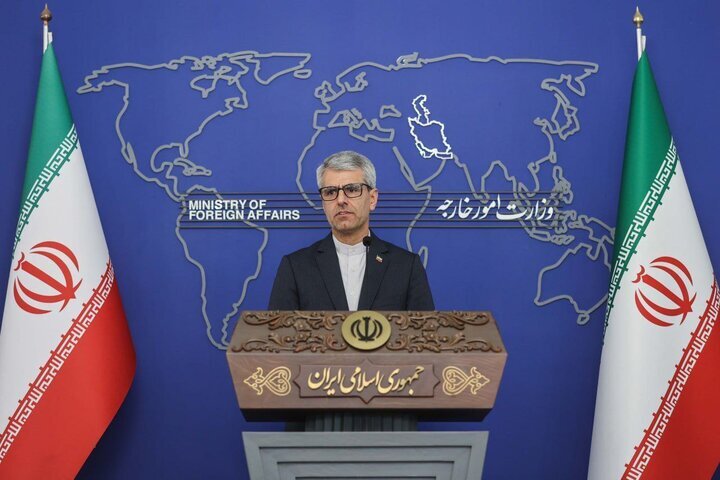Israel’s crimes in Gaza cannot go unpunished: Iran foreign ministry

TEHRAN – Iran’s Foreign Ministry spokesman Esmail Baghaei has condemned Israel’s ongoing genocide in Gaza, noting the killing of five international journalists just a day earlier.
“These crimes must not go unanswered,” he said during a press conference on Monday morning, urging international bodies such as the International Court of Justice and the International Criminal Court to take up the issue.
Baghaei also referred to the emergency summit held in Jeddah on the Palestinian crisis, saying Iran had tabled several proposals that were reflected in the final resolution. Among them was the condemnation of the Zionist prime minister’s recent admission of pursuing a “Greater Israel” project, which he said revealed territorial ambitions against neighboring countries.
The resolution, he added, called for halting arms sales to Israel and reconsidering diplomatic relations. “Follow-up at the UN and other institutions will be essential,” he stressed.
‘Iran-Russia ties not limited to one sector’
Addressing a question on Iran’s ties with Moscow, Baghaei underlined that relations with Russia are “comprehensive” and cover multiple areas, including energy. He confirmed that cooperation in natural gas was on the agenda, with details to be pursued by the Oil Ministry.
“Our approach to Russia is not limited to one sector,” he said. “It reflects a broader strategy of regional and international engagement.”
Baghaei also pointed to the upcoming Shanghai Cooperation Organization (SCO) summit on August 31 in China, where Iran’s president is expected to attend for the first time since joining the body.
‘Snapback sanctions: national interest is our red line’
Much of the briefing focused on Iran’s position regarding the so-called snapback mechanism under UN Security Council Resolution 2231. European states, he said, have no legal authority to trigger the return of UN sanctions on Iran.
“We do not underestimate the consequences,” Baghaei noted. “But we have long prepared to counter such abuse.” He said Tehran is coordinating closely with Russia and China, and reviewing Moscow’s draft resolution on the issue.
“Our red line is the national interest,” he stressed, adding that negotiations with Europe remain centered on lifting sanctions and safeguarding Iran’s rights under the nuclear agreement.
‘Hezbollah disarmament a matter for sovereign Lebanon’
Asked about calls for Hezbollah’s disarmament, Baghaei said the decision rests solely with Lebanon.
“A sovereign country must decide its own path,” he said, adding that living with dignity in a region facing Israeli aggression requires “robust defensive capabilities.”
‘U.S. shows unprecedented double standards on Gaza’
The spokesman harshly criticized Washington’s stance on Gaza, accusing it of enabling war crimes while lecturing others about human rights. “International law has never been under such brazen assault,” he said. “The double standards are unprecedented.”
On U.S. conditions for negotiations, Baghaei reiterated that Tehran is not opposed to dialogue but will never accept threats or coercion. “It was not Iran that betrayed diplomacy,” he said, pointing to stalled nuclear talks. “We remain ready when it serves national interests.”
‘Ukraine’s actions will meet reciprocal measures’
Baghaei condemned Ukraine’s decision to cancel bilateral agreements with Tehran, saying Kyiv had acted on “false claims” about Iranian involvement in the war. “Such unjustifiable actions will be met with reciprocal measures,” he warned.
He also rejected reports in Western media that Iran was prepared to accept “zero enrichment,” calling them fabricated. British sanctions, he added, are “contradictory” to Europe’s calls for dialogue and violate international law.
‘IAEA pressure on Iran unprecedented and illegal’
Despite tensions, Baghaei reaffirmed Iran’s membership in the Non-Proliferation Treaty (NPT) and said technical discussions with the International Atomic Energy Agency (IAEA) are ongoing. He criticized Western pressure on the Agency to inspect Iranian sites that had come under attack, calling it “unprecedented and illegal.”
He also discussed the “3+3” regional cooperation format with South Caucasus states, describing it as an effective framework for addressing regional issues.
‘Sovereign exchanges between Iran and Africa are normal’
Turning to Africa, Baghaei rejected U.S. criticism of South Africa’s defense ties with Iran, noting Tehran’s historic support for the anti-apartheid struggle.
“Exchanges between sovereign states are normal,” he said. “What is abnormal is Washington’s interference.”
‘Peaceful nuclear enrichment remains non-negotiable’
Baghaei concluded by dismissing reports of a U.S.-backed proposal for a regional enrichment consortium, saying Iran treats such ideas with caution. “Under the NPT, our right to peaceful enrichment is non-negotiable,” he said.
Reflecting on the past year, he described it as a “difficult but defining period” for Iran’s diplomacy. “The Foreign Ministry stood at the forefront of defending Iran’s legitimacy during the 12-day national defense,” he said. “Our policy remains clear: safeguard national interests, resist coercion, and pursue constructive engagement wherever possible.”
Leave a Comment